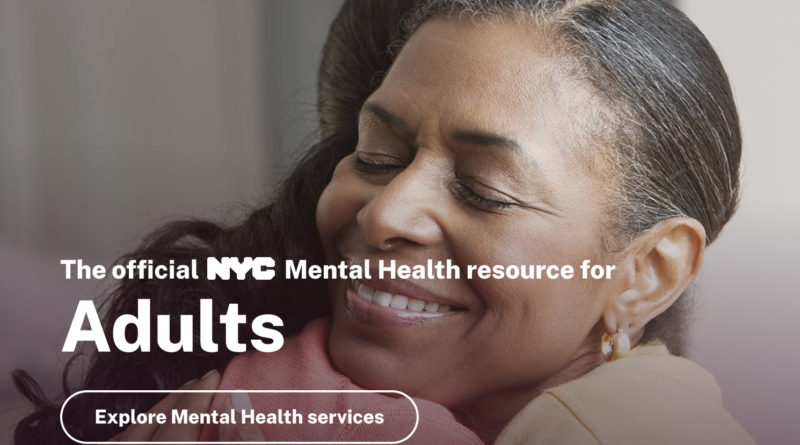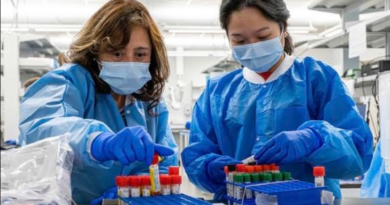NYC Launches Mental Health Website
Mayor Bill de Blasio and First Lady Chirlane McCray unveiled a new comprehensive website and public education campaign to help New Yorkers navigate all the mental health resources available to them and find substance misuse support that meets their needs. Mental Health for All builds on the City’s longstanding commitment to expand access to mental healthcare for New Yorkers and ensure mental health remains a permanent priority for the City government.
“As we recover from COVID-19 and write the next chapter, we must support the health and well-being of every New Yorker,” said Mayor de Blasio. “This website and public education campaign will ensure that everyone knows where to turn for help when they need it most.”
“Seven years ago, as we talked with New Yorkers throughout the boroughs, it was clear there was a HUGE need for more mental health and substance misuse services. The pandemic has augmented that need and made it glaringly evident how common and debilitating mental health challenges can be,” said First Lady McCray. “More people are realizing that mental fitness is just as important as physical fitness and now, for the first time, New Yorkers will have a one-stop, online connection to all of the new and expanded mental health and substance misuse services available to them through the City.
The website, MentalHealthforAll.nyc.gov, provides resources for any New Yorker, with any kind of mental health need and is a comprehensive hub with helplines and services that offer a range of free, direct support to meet the diverse needs. NYC Opportunity will manage the digital product, working with other City agencies to ensure it meets users’ needs and continues to evolve to support the City’s goal of connecting people to mental health care services. Ads will run in multiple languages on buses, bus shelters, subways across the City with a focus on neighborhoods that have been hardest hit by COVID-19.
“Last year, we were faced with multiple public health crises, including a mental health crisis as people grappled with the many impacts the pandemic’s uncertainty and isolation brought with it,” said Deputy Mayor for Health and Human Services Melanie Hartzog. “This Mental Health for All resource page helps New Yorkers know where and how to reach out for services they might be in need of, potentially reducing one more stressor from their everyday lives. Thank you to all our City partners that helped develop this important tool.”
As part of the announcement, Mayor de Blasio also released a new report on the comprehensive mental health support provided to every New Yorker – broken into five groups we are focused on as we recover from COVID-19:
- Our students and young people. The past year has had a profound effect on our children who have been subject to isolation, different forms of learning, and loss in their families and communities.
- Our communities of color. COVID-19 didn’t create inequities in mental health care – it revealed and exacerbated them. We will continue to bring additional resources to communities that have been underserved for decades.
- New Yorkers who want or need help for substance misuse. The opioid crisis hasn’t gone away – and substance misuse has, for many, gotten worse during COVID-19.
- New Yorkers with serious mental illness (SMI). The COVID-19 pandemic has made it more difficult to stay connected to care. New initiatives help avert crises and provide long-term care that promotes real stability in people’s lives.
- Every New Yorker who needs help. Everyone has been affected in some way by this past year, and our mission is to go into our communities to ensure every person has the support they need.
“It’s critical that we make City mental health services easy to find, and easy to understand. This website unites City agencies in their missions to provide the best possible services to New Yorkers,” said NYC Health Department Executive Deputy Commissioner Dr. Chinazo Cunningham. “Through Mental Health for All, we remind New Yorkers that help is always available, and is often a phone call away.”
“From creating NYC Well to embedding new services directly into communities, New York City has brought more mental health support to more people, and in more ways, than ever before,” said Susan Herman, director of the Mayor’s Office of Community Mental Health. “As New Yorkers continue to feel the mental health effects of COVID-19, Mental Health for All will make it even easier to find the right support, right when it’s needed.”
“We applaud the creation of this valuable tool that helps eliminate some guessing from where and how to access mental health services in our City,” said NYC Health + Hospitals Deputy Chief Medical Officer and Director of the Office of Behavioral Health Charles Barron, MD. “As we continue to break down stigmas around mental health, our hope is that more and more people proactively seek the care they need. Resource pages like the Mental Health for All webpage makes this easier for all New Yorkers in need.”
“Mental Health for All is an essential new digital tool to support New Yorkers with their mental health care needs during the pandemic and beyond,” said Matthew Klein, executive deirector of the Mayor’s Office for Economic Opportunity. “We are proud to work with our colleagues in City government to help make it as easy as possible to find and access mental health resources – services that are so critical for New Yorkers to live to their fullest potential.”
Nearly 1.6 million adult New Yorkers experience mental illness every year, and the COVID-19 pandemic has deepened and expanded mental health needs. Prior to the pandemic, approximately 9% of adult New Yorkers experienced symptoms of depression each year. At the height of the pandemic, 44% of adult New Yorkers reported symptoms of anxiety due to COVID-19, 36% reported symptoms of depression, and 35% of adults with children reported that the emotional or behavioral health of a child has been negatively affected. And even before pandemic, New Yorkers of color were at greater risk of mental health challenges yet received less mental health care than white New Yorkers – the pandemic has exposed and exacerbated these disparities.
Under the de Blasio Administration, New York City has embraced the mission to provide universal support and access to care. The City has guaranteed health care to every New Yorker, which includes mental health support. Through the Mayor’s Office of Community Mental Health, in partnership with more than a dozen City agencies and nearly 200 community organizations, we have closed critical gaps, brought resources to those most in need and given New Yorkers simple, direct ways to connect to care. The City has also expanded mental health support for public school students, with social-emotional learning in every school and universal screenings beginning this school year. Mental Health for All brings many of these resources together so those experiencing emotional and behavioral health challenges can easily find the support that’s right for them.
“People everywhere face challenges and suffer mental health issues. While awareness has grown, many barriers remain, and for too many people it can be a struggle to access the help they need. It is my hope that this initiative will help New Yorkers reach the help they need to fulfill their greatest potential,” said Senator Simcha Felder.
“This effort will allow more New Yorkers to gain access to critical mental health resources”, said Senator Roxanne J. Persaud. “A single phone can save lives, it’s important that every New Yorker knows they can ask for help at any time.”
“Health care means more than just treating physical illness. By expanding New Yorkers’ access to critical mental health care services through the ‘Mental Health for All’ website, the City is expanding New Yorkers’ access to care by connecting them even more conveniently to a range of free, direct support,” said Assembly Member Richard N. Gottfried, Chair of the Assembly Health Committee.
“We applaud New York City’s efforts to make it easier for city residents to find care when and where they need. This is an important step in keeping New York City healthy and strong,” said Chuck Ingoglia, president and CEO National Council for Mental Wellbeing.
“The American Psychological Association applauds this effort to make mental health care available to all New Yorkers,” said APA Chief Executive Officer Arthur C. Evans Jr., PhD. “Mayor de Blasio and First Lady McCray deeply understand the importance of getting evidence-based care and resources to everyone in their city who needs it. As we continue to navigate the COVID-19 pandemic, this public education campaign could not be more critical than it is at this moment.”
“Mental Health America applauds the work of the de Blasio administration to comprehensively address the mental health needs of all New Yorkers,” said Schroeder Stribling, president and CEO, Mental Health America. “These efforts to expand mental health services with a focus on access and equity are vital to meeting the needs of all residents, especially during this time of national crisis which has dramatically increased the number of people struggling with anxiety, depression and other mental health distress, and which has disproportionately affected marginalized and low-income communities. The de Blasio administration’s launch of a new website and public education campaign, in addition to their other efforts to provide comprehensive services for all mental health conditions, is a big step forward and builds upon the city’s commitment to be there for all who are in need. Mental Health America is appreciative of New York City’s leadership and example during this critical time for America’s mental health.”
“Especially as we hope to round the corner on the pandemic, listening to people’s needs is critically important,” said Natalie Davis, CEO and co-founder of USofCare. “Expanding access to mental health care and helping people understand the system are two of the biggest needs nationwide. USofCare is pleased to see New York City providing mental health resources that will have real and positive outcomes for people.”
For more New York City Technology news and culture, follow us on Instagram and Twitter @NYCWired.





